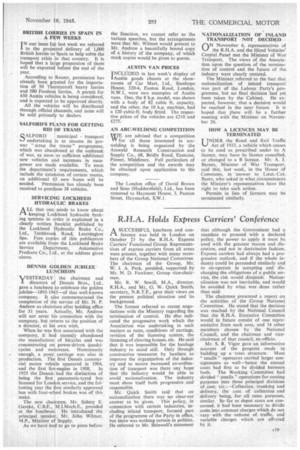R.H.A. Holds Express Carriers' Confeience
Page 21

If you've noticed an error in this article please click here to report it so we can fix it.
SUCCESSFUL luncheon and conference was held in London on October 23 by the R.H.A. Express Carriers' Functional Group. Representatives of express carriers from all areas were present, together with many members of the Group National Committee. The chairman of the Group, Mr. W, J. A. Peck, presided, supported by Mr. N. D. Fawkner, Group vice-chairman.
Mr. R. W. Sewill, M.A., director, R.H.A., and .Mr, G. W. Quick Smith, secretary, N.R.T.F., gave their views on the present political situation and its background.
The former referred to recent negotiations with the Ministry regarding the termination of control. He also indicated the progressive work which the Association was undertaking in such matters as rates, conditions of carriage, revision of the licensing system, the licensing of clearing houses, etc. He said that it was impossible for the haulage industry to stand still. Only through constructive -measures by hauliers to improve the organization of the industry and to secure increased co-ordination of transport was there any hope that the industry would be able to avoid nationalization. The industry must show itself both progressive and responsible.
Mr. Quick Smith said that on nationalization there was no clear-cut answer to be given. This policy, in connection with certain industries, including inland transport, formed part of the programme of the Party in office, but there was nothing certain in politics. He referred to Mr. Shinwell's statement that although the Government had a mandate to proceed with a declared policy, the power to apply it must be used with the greatest reason and discretion, and not in doctrinaire fashion. Express carriers had always had a progressive outlook, and if the whole industry could be persuaded similarly and to .co-operate in accepting and discharging the obligations of a public service, the risk would dimjnish. Nationalization was not inevitable, and would be avoided by what was done rather than said.
The chairman presented a report on the activities of the Group National Committee. He stated that the decision was reached by the National Council that the R.H.A. Executive Committee would in future consist of one representative from each .area, and 14 other members chosen by the National Council, and the chairman and vicechairman of that council, ex-officio.
Mr. S. R. Vigor gave an informative account of the progress made in building up a -rates structure. Most " smalls " operators carried larger consignments as well—hence the annual costs had first to be divided between both. The Working Committee had divided smalls " operations for costing purposes into three principal divisions of. cost, viz.:—Collection, trunking and delivery, the cost of collection and delivery being, for all rates purposes, similar. So far as depot costs are concerned, it had been necessary to divide costs into constant charges which do not vary with the volume of traffic and variable charges which are aff:cted by it.




















































